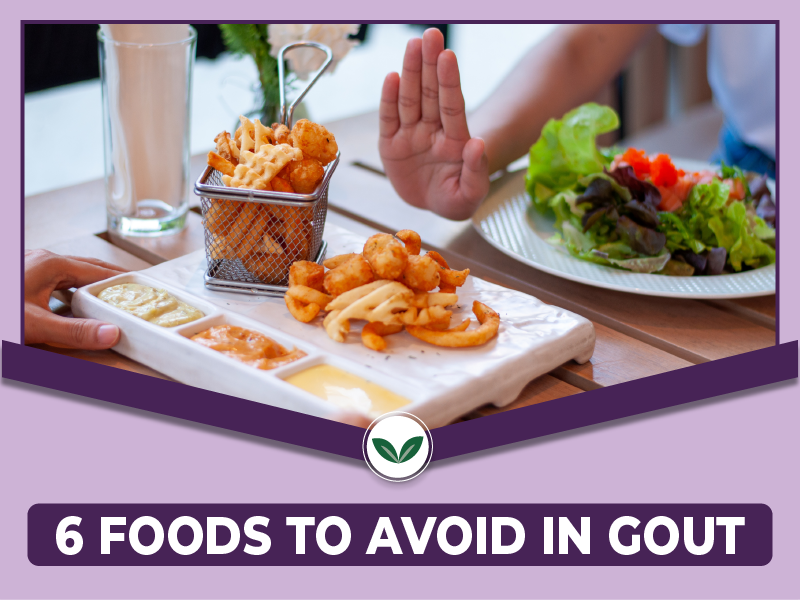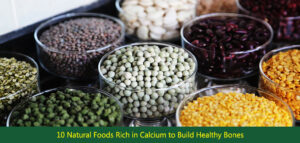
Reading time: 4 min 3 sec
In this blog we have listed down the foods to avoid in gout along with which foods you should add in your diet to keep your bones healthy.
Gout is a type of arthritis that occurs when excess uric acid builds up in the bloodstream and forms crystals in and around joints, causing pain and swelling.
While genetics, age, and certain medical conditions can play a role in Gout, dietary habits also play a significant part in developing the condition.
Ayurveda, the traditional Indian system of medicine, offers several natural remedies for treating Gout.
It is a common form of arthritis, affecting millions of people worldwide.
What are the Symptoms of Gout?
- Sudden, intense pain in the joints
- Swelling, inflammation in the joints
- Extreme tenderness of the joint
- Red or purple skin around the joint
- Alternating chills and fever
- Recurring attacks with soft fleshy growths
- Accumulations of uric acid crystals
What are the Causes of Gout?
- Intake of a diet consisting of salty, sour, and spicy food
- Intake of alkaline or fatty food
- Intake of uncooked food
- Moist and dry things
- The meat of aquatic and marshy animals
- Excessive intake of radish, horse gram, black gram, and other leguminous vegetables
- Excessive intake of sesame paste, sugarcane, curd, sour gruel, buttermilk, sura or asavas, i.e. alcoholic drinks
- Incompatible foods
- Eating during indigestion
- Anger
- Day sleep
- Injury
- Fasting in excess
- Journey on carts carried by horses and camels
- Sporting in water
- Excessive travelling on foot in the hot season
- Excess sexual intercourse
- Suppression of natural urges
Types of Gout:
There are several types of Gout, including:
Acute Gout:
This is the most common form of Gout, characterized by sudden, severe pain attacks and swelling in the affected joint. The pain can be so intense that it may wake you up in the middle of the night.
Interval Gout:
This type of Gout occurs between episodes of acute Gout and is characterized by mild to moderate joint pain and stiffness.
Chronic Gout:
Chronic Gout is a condition that occurs when gout attacks become more frequent and last longer.
Over time, repeated gout attacks can lead to permanent damage to the affected joints.
Asymptomatic Gout:
This type of Gout is characterized by the presence of uric acid crystals in the joints but without any symptoms. People with asymptomatic Gout may have elevated uric acid levels in their blood but do not experience any pain or swelling in their joints.
Tophaceous Gout:
The buildup of uric acid crystals in soft tissue such as the skin, tendons, and cartilage characterizes this type of Gout. Tophaceous Gout can cause painful nodules or lumps in these areas, leading to permanent damage if left untreated.
Treatment for Gout typically involves medications to reduce pain and inflammation, as well as medications to lower the levels of uric acid in the blood. Lifestyle changes, such as a healthy diet and regular exercise, can also help manage the symptoms of Gout.
If you are experiencing symptoms of Gout, it is essential to seek ayurvedic treatment as soon as possible. An early diagnosis and prompt treatment can help prevent the condition’s progression and reduce the risk of permanent joint damage.
5 Foods to Avoid for Gout
The following are the foods that are most commonly associated with increasing the risk of Gout:
High-Purine Foods:
Purines are naturally occurring compounds found in many foods. When purines break down in the body, they form uric acid. High-purine foods include organ meats such as liver, kidneys, sweetbreads, anchovies, sardines, and mackerel.
Alcohol:
Alcohol, especially beer, can increase the production of uric acid in the body and can also interfere with eliminating uric acid from the body.
Sweetened Drinks:
Sugary drinks like soda and fruit juice can lead to increased insulin levels, which can increase the production of uric acid.
Red Meat:
Consuming large amounts of red meat, especially beef and pork, can increase the risk of Gout.
Processed Foods:
Processed and packaged foods that are high in fructose can contribute to Gout.
High-Fructose Corn Syrup:
Foods and drinks that contain high-fructose corn syrup, like candy, baked goods, and sweetened beverages, can also increase the risk of Gout. It is important to note that while these foods can increase the risk of Gout, not everyone who consumes them will develop the condition. Additionally, everyone’s bodies react differently to these foods, so keeping track of how your body reacts to them and making adjustments as needed is essential.
Here are some Ayurvedic Recommended Foods for Gout:
Ginger:
Ginger has anti-inflammatory properties that can help reduce the pain and swelling associated with Gout. You can consume ginger by adding it to your diet or taking it as tea or ginger water.
Turmeric:
Turmeric has a powerful anti-inflammatory compound called curcumin, which effectively treats Gout. You can consume turmeric by adding it to your daily diet.
Castor oil:
Castor oil has been used in Ayurveda for its anti-inflammatory and pain-relieving properties. You can apply castor oil to the affected joint or take it orally.
Aloe Vera:
Aloe Vera has anti-inflammatory properties that can help reduce the pain and swelling associated with Gout. You can apply aloe vera gel directly to the affected joint.
Guggulu:
Guggulu is an Ayurvedic herb that effectively reduces joint pain and swelling. You can take Guggulu in herbal medicine form. Remember to consume anything in the form of medicine please consult our expert doctor at Ayushakti Ayurved. Click here!
Triphala:
Triphala is a blend of three fruits commonly used in Ayurveda for its detoxifying and anti-inflammatory properties. You can take Triphala in supplement form or use it as a mouthwash.
It is important to note that these remedies should be used with a balanced diet and lifestyle changes, such as reducing the consumption of alcohol and foods high in purines. It is always best to consult a qualified Ayurvedic practitioner before starting any new treatment.
Takeaway:
If you have Gout or are at risk of developing Gout, it’s essential to consult an ayurveda expert about the best diet and lifestyle changes for your individual needs. In addition to avoiding the foods listed above, incorporating low-purine foods like fruits, vegetables, and whole grains into your diet can help lower uric acid levels and reduce the risk of gout flare-ups.
Ayushakti‘s mission is to help people in every possible way. You can consult our experts on phone or video. We will suggest diet & home remedies for maintaining your well-being in these difficult times.
Book your consultation here – https://bit.ly/3XiG50D
For more information write to us at info@ayushakti.com
You may contact us on our toll-free numbers – 18002663001 (India) & +18002800906 (Global)
Author of the Blog: DR. SONAL
Expert Review By: Dr Smita Pankaj Naram
Co-Founder, Ayushakti Ayurved Pvt Ltd









